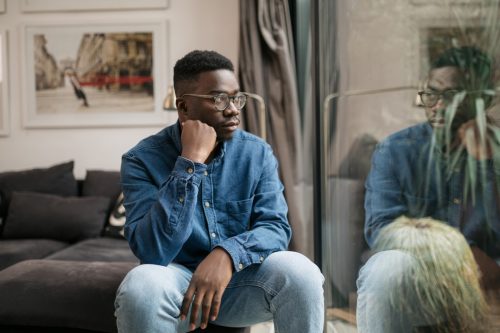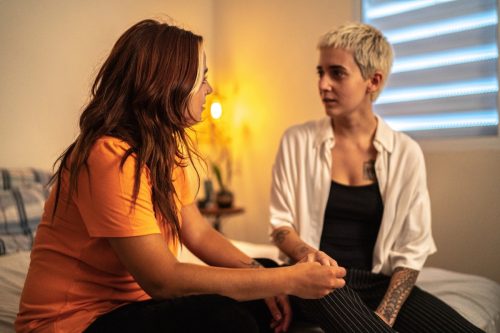10 Signs Someone Is Emotionally Unavailable, Therapists Say

We all have people we rely on for support when we need to vent or times get tough: These friends or significant others know how to listen or offer helpful advice when we ask for it. But there are also people in our lives who we just wouldn’t turn to in these moments. Perhaps they never have the most empathetic response, or have a reputation for not answering their phone. But if you can’t quite pinpoint why you don’t text or call certain people, it could be because you’ve subconsciously clocked them as emotionally unavailable.
“The core meaning of being emotionally unavailable refers to an individual’s inability or unwillingness to connect deeply with others on an emotional level,” Courtney Hubscher, LMHC, LCPC, NCC, of GroundWork Cognitive Behavioral Therapy, tells Best Life. “This can stem from a variety of causes, including past trauma, ongoing stress, mental health issues, or even certain personality traits like extreme introversion or narcissism.”
Therapists say there are some telltale signs that someone is emotionally unavailable, including how they act around you and how they make you feel. Read on to find out what you should keep an eye out for with your friends and partners.
RELATED: I’m a Psychologist and These Are the 5 Telling Signs Someone Is a Narcissist.
1
They avoid deep conversations.

An aversion to ever going deep in conversations is a key sign that someone isn’t interested or able “to enter the realm of emotions in healthy, attuned ways,” clinical psychologist Carla Marie Manly, PhD, says.
Someone who is emotionally unavailable will want to keep conversations “surface-level,” Hubscher notes.
“Although emotionally unavailable people may communicate well in work situations where they feel in control, they tend to have difficulty with intimate communications,” Manly explains. “They may close off and multi-task to avoid direct, heartfelt discussions.”
You can recognize someone’s aversion to deep conversation if they avoid eye contact or display other “defensive body language signs” like crossing their arms across their chest, Manly notes.
“This usually occurs on an unconscious level and are behaviors that help the person feel safe and invulnerable,” she says.
2
They can’t commit.

Emotionally unavailable friends and significant others also struggle with commitment. According to Hubscher, they may do this in romantic or platonic relationships.
“[Emotionally unavailable people] don’t talk about the future. When their romantic partner or friend brings up future events, they may find ways to change the subject, give vague answers, or just remain silent,” Beth Ribarsky, PhD, professor and director of the School of Communication and Media at the University of Illinois Springfield, tells Best Life.
She adds, “They are difficult to make plans with. They may give vague answers to invites like, ‘We’ll see.'”
RELATED: 5 Red Flags About the Emojis Your Partner Is Texting, According to Therapists.
3
They see the world in black and white.

According to Manly, who is also the author of The Joy of Imperfect Love, emotionally unavailable people also have a very “black-and-white view of the world.”
“They may tend to see in terms of right/wrong and good/bad,” she notes. “This dualistic way of thinking keeps them feeling safe and helps avoid the vulnerability that comes with considering the ‘gray areas’ of life and relationships.”
4
You feel undersupported in your relationship.

Even if friends and family seem to “genuinely care about you,” you may still feel alone in the relationship, and it’s important to take stock of that feeling, Ribarsky says.
“For example, you might share a story about your bad day, but they seem uninterested, ultimately leaving you feeling unsupported,” she explains.
5
They mask their fears.

According to Manly, people who struggle with emotional availability also have their own coping methods, and they may turn to hobbies or even substances to hide the fact that they’re scared of deep interpersonal connections.
“Although it is not highlighted much in the media, addictions are a way that emotionally unavailable people mask their fears—including the fear of being deeply connected to others,” she says. “An emotionally unavailable person may engage in overuse or misuse of substances (alcohol, drugs, etc.), work, video games, gambling, sex, etc. to avoid intimate connection and bonding.”
6
They’re constantly withdrawn.

If you notice someone in your life is “retreating physically or emotionally” when things get “too serious,” that could be another sign that they’re emotionally unavailable, Hubscher says.
They may specifically withdraw when conflict arises.
“Emotionally unavailable people may completely avoid healthy conflict that is a natural part of life; they may shut down, compartmentalize, and even disappear,” Manly says.
In these situations, they might use anger or criticism to avoid conflict and conversations “that could lead to a deeper relationship,” she notes.
RELATED: 6 Passive-Aggressive Comments That Mean Your Partner Wants to Break Up.
7
They see you as dependent.

We all have emotional needs, but some are more intense than others—and someone who actively pulls back from emotional investment altogether may insinuate that you’re overly needy.
As Hubscher puts it, these people “perceive someone’s desire for emotional closeness as needy or clingy, often using it as a reason to create distance.”
8
They struggle to express positive emotions.

According to Ribarsky, those who are emotionally unavailable have difficulty with positive emotions.
“Although they may be able to express frustrations, anger, or other negative emotions, when it comes to anything resembling affection or intimacy, they often clam up,” she says. “Everyone varies in how they may express and desire to receive affection, but emotionally unavailable individuals often remain indifferent.”
RELATED: 7 Body Language Signs That Mean Someone Is Lying, According to Therapists and Lawyers.
9
Their communication is inconsistent.

Overall, emotionally unavailable people struggle with regular communication.
They may be inconsistent, meaning they’re available at one point but then suddenly “distant and unresponsive without clear explanation,” Hubscher says.
10
They push you away.

Another sign of emotional unavailability is when someone actively pushes you away.
“The emotionally unavailable person will often unconsciously or consciously engage in toxic behaviors that prevent the safety and trust that build intimacy,” Manly says.
How should I interact with an emotionally unavailable person in my life?

According to Ribarsky, when dealing with someone who’s emotionally unavailable, it’s essential to “meet them where they’re at.”
“When forced to discuss their feelings, they may only dig their heels in further, creating even greater emotional distance and resentment. However, it is important to note how you feel and how the other’s actions influence you,” she says.
In addition, consider whether this person is “providing adequate benefits to your relationship for the investments you’ve made,” Ribarsky advises. While they may become slightly more vulnerable as you build trust, dramatic change is unlikely.